
Ivanka Trump Is Seriously Off The Mark On This Tax Bill Comment
Ivanka, Ivanka, Ivanka. The first daughter and adviser to the president went on Fox and Friends early on Thursday, Dec. 21 to talk up the tax bill that the GOP passed on Wednesday. But while discussing the bill, she made some, uh, pretty out there statements. Ivanka Trump suggested that the tax bill would eliminate the national debt, and, uh, no, it won't.
In an interview discussing Trump’s influence on the bill, particularly on the expanded child tax credit, Trump discussed how she and other advocates of the bill won over Republican Senator Bob Corker of Tennessee, who had been staunchly against any bill that would raise the national debt. Trump said that Corker felt his concerns about the bill had been “adequately addressed.” She continued,
He really believes that tax relief, coupled with the administration's deregulatory actions, will create the growth that will start to erode and ultimately eliminate the national debt that has been accrued over the last several decades.
Only problem? Analyses of the bill predict it will do the exact opposite. In fact, the bill is actually predicted to add an eye-watering $1 trillion dollars to the deficit over 10 years, according to the nonpartisan Joint Committee on Taxation (JCT). And that's a best case scenario, which takes into account money brought back via economic growth. Unless something major changes, that that likely means that the national debt will also increase along with an increased deficit.
Most analyses, in fact, predict that the bill will add to the deficit — the Congressional Budget Office (CBO) projects the deficit to increase by $1.4 trillion, though that account doesn't factor in growth. Even one of the more positive analyses, from the Tax Foundation, predicts the deficit to increase by over $500 billion after growth.
Trump has spent quite a bit of time stumping for the bill, both before and after its passage. She's been a vocal advocate about expanding the Child Tax Credit in order to help women and families (though how much it will actually help low- and middle-income families is negligible, according to Newsweek), so it's not unusual that she would be continuing to talk it up. To be fair, Trump is describing Corker's beliefs — but it's pretty clear that she's standing behind them. And Corker's beliefs aren't uncontroversial by a long shot.
Corker drew fire even before the bill's passage for his complete 180 on the bill. Corker had long been known as a deficit hawk who wouldn't approve anything that would increase the national debt. In fact, back in October, Corker told Meet The Press that he would refuse to vote for the GOP tax plan if it didn't meet his standards on debt. He said,
If it looks like to me, Chuck, we're adding one penny to the deficit, I am not going to be for it, OK? I'm sorry. It is the greatest threat to our nation. The greatest threat to our nation.
Well, that greatest threat didn't last long. Shortly before the Senate voted on the bill, Corker announced that he would vote for it, despite his previous stance. After his announcement, he was accused of changing his vote in self interest — an added provision would make it easier for real-estate developers to take advantage of pass-through business tax structures, according to The New York Times, and Corker has a financial stake in companies that would benefit from the change. Corker has denied having anything to do with the added provision, according to the Times. But on social media, people called it the "Corker kickback," and called the senator out.
Then again, the deficit may be something of a far-off priority for the majority of Americans.
While the majority of earners will likely see a tax cut over the next year, by 2027, people and families making under $75,000 a year, or about 53 percent of households, will actually see an increase in their taxes, per NPR. By that point, more than 80 percent of the benefits of the bill will be going to households earning $1 million or more per year. And that's not even going into the changes to health care — the bill also repeals the individual mandate which requires people to buy health insurance, which means that the cost of health insurance premiums will likely skyrocket. The CBO predicts that the number of people with health insurance will decrease by about 13 million by 2027 thanks to the changes.
What a gift to find in your Christmas stocking. Happy Holidays, everyone.